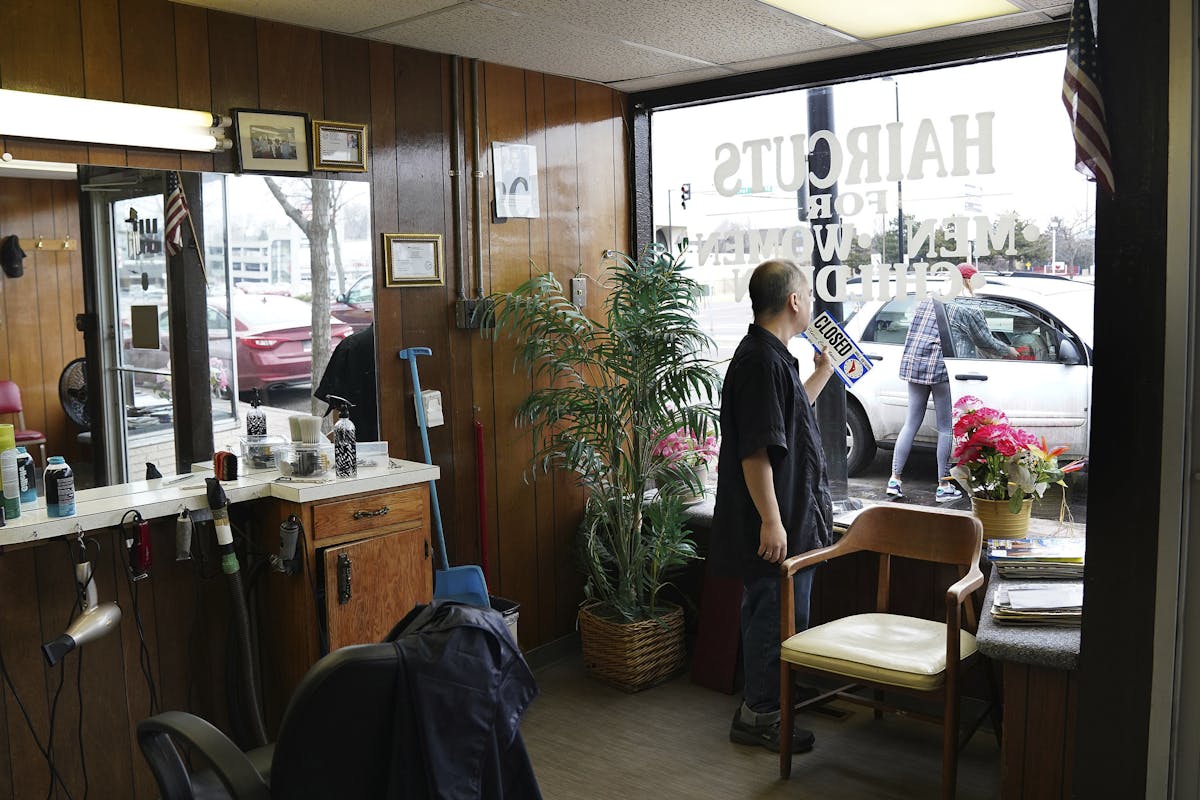It was a strange week at Indigo Signworks.
The Chanhassen-based commercial sign company eased its Minnesota operations back into business on Monday, amid the still unsettled atmosphere created by the coronavirus pandemic.
Employees were assigned varied start times to space out their arrivals. Cubicles were encircled in 6-foot arcs of tape on the floor. Bottles of disinfectant were everywhere.
"Some were happy to be back. Some were understandably a little anxious," Eric Gibson, the company's chief executive, said. "You isolate for two weeks and suddenly you're thrown back into the world. It was a unique experience."
Gov. Tim Walz is allowing some employers that were ordered closed at the end of March to reopen, while keeping others closed to reduce person-to-person contact that might spread the virus. For those still on the sidelines, the experience at firms like Indigo shows what lies ahead.
"We think we can control the risk," Gibson said. "We can't sit on the sidelines forever. If I come back and there's no business left, I didn't do my people any favors at all either."
Indigo Signworks designs, makes and installs everything from large signs atop pylons to small vinyl letters displaying store hours. Its customers include banks, casinos, restaurants, gas stations, apartments and hotels, mostly in the Upper Midwest.
About half of the company's 145 employees work in Minnesota, where Gibson maintained health insurance while his workforce filed for unemployment insurance during a two-week furlough. The other half is in North Dakota, where state officials didn't require operations to shut down.
Gibson said he used the two-week pause to evaluate the company's processes at its sites in Chanhassen, Alexandria and St. Cloud, and to put safety measures in place.
Stickers were placed on the production floor to remind workers to keep appropriate social distancing. Doors between areas were propped open so no one had to touch door handles.
Out in the field, Indigo stopped rotating people on installation crews. Now they work in dedicated teams of two, making it easier to isolate a few employees should someone get sick.
Once a job is completed, workers wipe off the pen with a sanitizer, hand it over for a signature and let the customer keep it.
"There are so many little touches that we didn't used to do," Gibson said. "We're being very conscious about how we're supporting our customers and employees at the same time."
Gibson spent much of Thursday delivering face masks to Indigo's manufacturing and production sites before heading off to North Dakota, which during the shutdown was able to fulfill some orders for Minnesota businesses.
Among them were signs Indigo made for free for Minnesota hospitals that had converted ICUs or orthopedic wings to handle COVID-19 cases or needed exterior signs to redirect traffic.
"I was trying to balance two governors who are looking at this problem completely differently," Gibson said. "A lot of our competitors took a don't-ask-don't-tell approach."
Indigo Signworks had argued unsuccessfully that it provides needed supplies to many of the businesses deemed essential under Minnesota's emergency orders, such as exit signs or fire escape routes for hospitals or apartment buildings.
Gibson said it was a frustrating stretch for the company, with sales of $20 million to $25 million in a normal year, and it put pressure on Indigo's customers, such as builders who needed signs to get permits.
"People are trying to figure out how to balance business with the health of their employees and the health of the state," Gibson said. "I'm wholly supportive of the decision. I just want to make sure we're on a level playing field."
Now that Indigo is back online in both states, Gibson is working through uncertainty and new protocols.
The company spent $15,000 on laptops and monitors, enabling about 60% of employees to work from home. Gibson plans to continue to rotate staff to keep numbers low at facilities. And there will continue to be rough patches as graphic designers and others adapt to a more digital world, he said.
But he said there's a feeling of renewed camaraderie among his workforce.
"This is their state," he said, "but it's also their jobs and their health."
Jackie Crosby • 612-673-7335 Twitter: @JackieCrosby

Want to share info with the Star Tribune? How to do it securely

'Safe recovery sites' would offer syringes, naloxone and more to people using drugs. The plan could be in peril.
New Minnesota GOP leaders seek peace with party's anti-establishment wing

Who is Republican Lisa Demuth, Minnesota's first House speaker of color?

